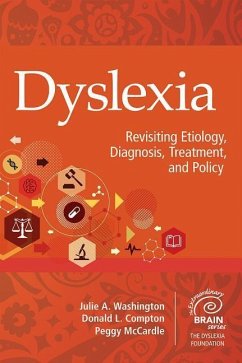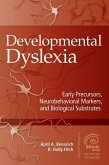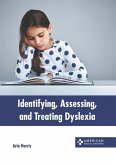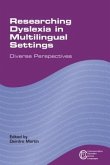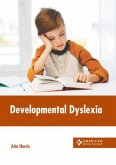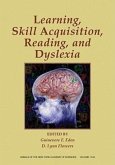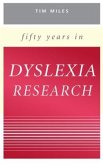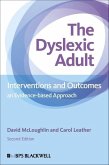Julie A Washington, Donald L Compton, Peggy McCardle
Dyslexia
Revisiting Etiology, Diagnosis, Treatment, and Policy
Schade – dieser Artikel ist leider ausverkauft. Sobald wir wissen, ob und wann der Artikel wieder verfügbar ist, informieren wir Sie an dieser Stelle.
Julie A Washington, Donald L Compton, Peggy McCardle
Dyslexia
Revisiting Etiology, Diagnosis, Treatment, and Policy
- Gebundenes Buch
- Merkliste
- Auf die Merkliste
- Bewerten Bewerten
- Teilen
- Produkt teilen
- Produkterinnerung
- Produkterinnerung
Based on presentations from the 17th Extraordinary Brain Symposium, this book brings together 50 top contributors who share their invaluable perspectives, findings, solutions, and questions to shape future dyslexia research.
Andere Kunden interessierten sich auch für
![Developmental Dyslexia Developmental Dyslexia]() Developmental Dyslexia80,99 €
Developmental Dyslexia80,99 €![Identifying, Assessing, and Treating Dyslexia Identifying, Assessing, and Treating Dyslexia]() Identifying, Assessing, and Treating Dyslexia155,99 €
Identifying, Assessing, and Treating Dyslexia155,99 €![Researching Dyslexia in Multilingual Settings Researching Dyslexia in Multilingual Settings]() Researching Dyslexia in Multilingual Settings150,99 €
Researching Dyslexia in Multilingual Settings150,99 €![Developmental Dyslexia Developmental Dyslexia]() Developmental Dyslexia154,99 €
Developmental Dyslexia154,99 €![Skill Acquisition, Reading, and Dyslexia Skill Acquisition, Reading, and Dyslexia]() EdenSkill Acquisition, Reading, and Dyslexia169,99 €
EdenSkill Acquisition, Reading, and Dyslexia169,99 €![Fifty Years in Dyslexia Research Fifty Years in Dyslexia Research]() Tim MilesFifty Years in Dyslexia Research65,99 €
Tim MilesFifty Years in Dyslexia Research65,99 €![The Dyslexic Adult The Dyslexic Adult]() David McLoughlinThe Dyslexic Adult64,99 €
David McLoughlinThe Dyslexic Adult64,99 €-
-
Based on presentations from the 17th Extraordinary Brain Symposium, this book brings together 50 top contributors who share their invaluable perspectives, findings, solutions, and questions to shape future dyslexia research.
Produktdetails
- Produktdetails
- Verlag: Brookes Publishing Company
- Seitenzahl: 320
- Erscheinungstermin: 24. Oktober 2019
- Englisch
- Abmessung: 231mm x 157mm x 23mm
- Gewicht: 544g
- ISBN-13: 9781681253619
- ISBN-10: 1681253615
- Artikelnr.: 56304010
- Herstellerkennzeichnung
- Libri GmbH
- Europaallee 1
- 36244 Bad Hersfeld
- gpsr@libri.de
- Verlag: Brookes Publishing Company
- Seitenzahl: 320
- Erscheinungstermin: 24. Oktober 2019
- Englisch
- Abmessung: 231mm x 157mm x 23mm
- Gewicht: 544g
- ISBN-13: 9781681253619
- ISBN-10: 1681253615
- Artikelnr.: 56304010
- Herstellerkennzeichnung
- Libri GmbH
- Europaallee 1
- 36244 Bad Hersfeld
- gpsr@libri.de
Julie A. Washington, Ph.D., Professor, Special Education and Communication Disorders, Department of Educational Psychology, Georgia State University, 30 Pryor Street, Atlanta, Georgia 30303 Dr. Julie A. Washington is a professor in the Department of Educational Psychology, Special Education and Communication Disorders at Georgia State University. Her research focuses on improving understanding of the relationship between language variation and literacy learning in African American children growing up in poverty. Donald L. Compton, Ph.D., Professor and Chair, Special Education Department, Peabody College, P.O. Box 228, 110 Magnolia Circle, 313 OMC, Vanderbilt University, Nashville, Tennessee 37203. Donald L. Compton is a professor and chair of the Special Education Department and a John F. Kennedy Center Investigator at Peabody College, Vanderbilt University. His research involves modeling individual differences in the development of children's reading skills and the identification of children with reading disabilities. Peggy McCardle, Ph.D., M.P.H., Owner, Peggy McCardle Consulting, LLC Peggy McCardle is a private consultant and an affiliated research scientist at Haskins Laboratories. She is the former chief of the Child Development and Behavior Branch of the Eunice Kennedy Shriver National Institute of Child Health and Human Development (NICHD), U.S. National Institutes of Health, where she also directed the Language, Bilingualism, and Biliteracy Research Program and developed various literacy initiatives. Dr. McCardle is a linguist, a former speech-language pathologist, and, in her remote past, a classroom teacher. Her publications address various aspects of public health and developmental psycholinguistics. The recipient of various awards for her work in federal government, including a 2013 NICHD Mentor Award, she also was selected in 2013 to receive the Einstein Award from The Dyslexia Foundation. Her publications address various aspects of public health and developmental psycholinguistics (e.g., language development, bilingualism, reading, learning disabilities) . Dr. McCardle has taught scientific and technical writing and has extensive experience developing and coediting volumes and thematic journal issues. Philip Capin, M.A., Researcher, The Meadows Center for Preventing Educational Risk, University of Texas at Austin, 1912 Speedway D4900, Austin, Texas 78712. Philip Capin is a doctoral student at the University of Texas at Austin (UT) studying special education with a concentration in learning disabilities and behavior disorders. Before joining the Meadows Center for Preventing Educational Risk and UT, he planned and directed sustainable professional development initiatives to enhance reading instruction and assessment. Capin is also an experienced special education teacher and a certified school administer. His research interests include empirically validated reading interventions, the measurement of reading comprehension, and response to intervention. Carol McDonald Connor, Ph.D., Senior Learning Scientist, Learning Sciences Institute, P.O. Box 872111, Arizona State University, Tempe, Arizona 85278-2111. Carol Connor is a professor of psychology at Arizona State University and a distinguished research associate at the Florida Center for Reading Research. Her research focuses on examining the links between young children's language and their literacy development with the goal of illuminating reasons for the perplexing difficulties that children who are atypical and diverse learners have with developing basic and advanced literacy skills. Most recently, her research interests have focused on children's learning in the classroom--from preschool through fifth grade--and developing technology and interventions to improve teacher efficacy and students' reading outcomes. Awarded the Presidential Early Career Award for Scientists and Engineers (2008), the Society for Research in Child Development, Early Career Award (2009), and the Richard Snow Award (APA, 2008), she is the principal investigator for studies funded by the U.S. Department of Education, Institute for Education Sciences, and the National Institute for Child Health and Human Development. She is also Editor of the Journal for Research in Educational Effectiveness (Impact Factor 3.15) and an Associate Editor for Child Development (Impact Factor 4.1). Barbara R. Foorman, Ph.D., earned her doctorate at the University of California-Berkeley. She is Professor of Pediatrics and Director of the Center for Academic and Reading Skills at the University of Texas-Houston Medical School and Principal Investigator of the grant funded by the National Institute of Child Health and Human Development (NICHD), Early Interventions for Children with Reading Problems. In addition to many chapters and journal articles on topics related to language and reading development, she is the editor of Reading Acquisition: Cultural Constraints and Cognitive Universals (Lawrence Erlbaum Associates, 1986). She is on the editorial board of Journal of Learning Disabilities and has guest edited special issues of Scientific Studies of Reading, Linguistics and Education and Journal of Learning Disabilities. Dr. Foorman has been actively involved in outreach to the schools and to the general public, having chaired Houston Independent School District's Committee on a Balanced Approach to Reading and having testified before the California and Texas legislatures and the Texas Board of Education Long-Range Planning Committee. Dr. Foorman is also a member of the National Academy of Sciences' Committee on the Prevention of Reading Difficulties in Young Children, the board of the Society for the Scientific Study of Reading, the Consortium on Reading Excellence (CORE), and several local reading efforts. Nadine Gaab, Ph.D., Associate Professor of Pediatrics, Boston Children's Hospital/Harvard Medical School, Department of Medicine/Division of Developmental Medicine, Laboratories of Cognitive Neuroscience, 1 Autumn Street, Boston, Massachusetts 02115. Nadine Gaab is an associate professor of pediatrics at Boston Children's Hospital/Harvard Medical School and a faculty member at the Harvard Graduate School of Education. Her current research focuses on auditory and language processing in the human brain and its applications for the development of typical and atypical language and literacy skills. The Gaab Lab is currently working on various topics with a main focus on early identification of developmental dyslexia in the prereading and infant brain. The Gaab Lab employs cross-sectional and longitudinal study designs and works closely with more than 20 private and public schools within the greater New England area. George K. Georgiou, Ph.D., Associate Professor, Department of Educational Psychology, 6-102 Education North, University of Alberta, Edmonton-AB, T6G 2G5, Canada. George Georgiou is an associate professor in the Department of Educational Psychology at the University of Alberta. His interests include the examination of the role of rapid naming in reading across languages, ages, and populations. In addition, he specializes in the factors (cognitive and noncognitive) that impede or facilitate literacy development across languages. Young-Suk Kim, Ed.D., Assistant Professor, Florida State University; Tallahassee, Florida; ykim@fcrr.org. Dr. Kim is a former classroom teacher in primary and secondary schools and community college in California. Dr. Kimâ (TM)s research areas involve language and literacy acquisition and instruction, including early literacy predictors; reading fluency and comprehension; and writing for children from various language backgrounds such as English, Korean, and Spanish. Dr. Kim is currently the principal investigator and co-investigator of several studies funded by the Institute of Education Sciences, U.S. Department of Education, and the National Institutes of Health. Nicole Landi, Ph.D., Faculty Member, Yale Child Study; Director of EEG Research, Haskins Laboratories, Haskins Laboratories and Yale University, 300 George Street, Suite 900, New Haven, CT 06511. Dr. Landi received her doctorate in psychology and cognitive neuroscience from the University of Pittsburgh in 2005. Her research examines the acquisition and development of reading and language as well as individual differences in reading and language skill. She studies these issues using multiple methodologies including functional magnetic resonance imaging and event-related potentials. By examining early school age children, adolescents, and young adults, her research spans a broad range of reading and language development. Maureen W. Lovett, Ph.D., C.Psych., Professor of Pediatrics and Medical Services, University of Toronto; Senior Scientist, Neurosciences and Mental Health Program; and Director, Learning Disabilities Research Program, The Hospital for Sick Children, 555 University Avenue, Toronto, Ontario, Canada, M5G 1X8. Maureen W. Lovett is a Senior Scientist in the Neurosciences and Mental Health Program at The Hospital for Sick Children and a Professor of Pediatrics and Medical Sciences at the University of Toronto. Her research focuses on questions about the effective remediation of decoding, word identification, fluency, and reading comprehension impairments in struggling readers in elementary, middle, and high schools. As a coprincipal investigator of the Institute of Education Sciences-funded Center for the Study of Adult Literacy, she is developing interventions for adult literacy learners as well. She and her team are also involved in knowledge translation initiatives: Their Empower(TM) Reading intervention programs are now used to teach struggling readers in school districts in four Canadian provinces. Joan A. Mele-McCarthy, D.A., Executive Director, the Summit School, 664 East Central Avenue, Edgewater, Maryland 21037. Joan Mele-McCarthy is the executive director of the Summit School, a school designed for students who have dyslexia and other learning differences. Prior to this position, she served as a special assistant to the assistant secretary for special education/rehabilitation services in the U.S. Department of Education and worked on policy issues related to the connections between special education and general education and between English Learners and disabilities. She also has served on university faculties in departments of communication sciences and disorders, owned and directed a private practice that provided direct intervention and school consultation, and worked in public schools. Her work is focused on language-based learning differences and special education policy. Brett Miller, Ph.D., Program Director, Eunice Kennedy Shriver National Institute of Child Health and Human Development (NICHD), 6100 Executive Boulevard, Suite 4B05, Rockville, Maryland 20852. Brett Miller oversees the Reading, Writing, and Related Learning Disabilities research portfolio at the National Institutes of Health (NICHD), which focuses on developing and supporting research and training initiatives to increase knowledge relevant to the development of reading and written-language abilities for learners with and without disabilities. Dr. Miller also codirects the Language, Bilingualism, and Biliteracy Research Program, which focuses on language development and psycholinguistics from infancy through early adulthood; bilingualism and/or second-language acquisition; and reading in bilingual and/or English-language-learning children and youth. Nicole Patton Terry, Ph.D., Associate Professor, Department of Educational Psychology and Special Education, and Director, The Urban Child Study Center, College of Education, Georgia State University, P.O. Box 3979, Atlanta, Georgia 30302. Nicole Patton Terry is the coordinator of the Behavior Learning Disabilities Program, a member of the Center for Research on Atypical Development and Learning and the Board of Regents Initiative on Research on the Challenges of Acquiring Language and Literacy, the director of the newly founded Urban Child Study Center in the College of Education, and a research scientist at Haskins Laboratories at Yale University. She is an associate editor of the American Journal of Speech Language Pathology. Her research concerns children who struggle with language and literacy, in particular children from culturally and linguistically diverse backgrounds, who speak nonmainstream American English dialects and who live in low-income or working-class households. Jay G. Rueckl, Ph.D., Senior Scientist, Haskins Laboratories; Associate Professor of Psychology, University of Connecticut; Head of the Psychology Departmentâ (TM)s Perception-Action-Cognition Division; Inaugural Director, University of Connecticut Cognitive Science Program, 300 George Street, Suite 900, New Haven, CT 06511. Dr. Rueckl was trained as an experimental psychologist, and his research combines behavioral methods with both neuroimaging and computational modeling. His primary research focus concerns word reading and its neural bases, and its main goal is to understand how linguistic experience and a universal learning mechanism jointly determine the commonalities and differences that are observed both between and within linguistic communities. Sharon Vaughn, Ph.D., H.E. Hartfelder/Southland Corp. Regents Chair in Human Development and Executive Director, The Meadows Center for Preventing Educational Risk, University of Texas at Austin, Sanchez Building, 1912 Speedway, Austin, Texas 78712 Sharon Vaughn is the executive director of The Meadows Center, an organized research unit at the University of Texas at Austin. She is the recipient of the American Education Research Association Special Interest Group Distinguished Researcher Award, the International Reading Association Albert J. Harris Award, the University of Texas Distinguished Faculty Award, and the Jeannette E. Fleischner Award for Outstanding Contributions in the Field of Learning Disabilities from the Council for Exceptional Children. She is the author of more than 35 books and 250 research articles. Vaughn is currently the principal investigator on several research grants from the Institute for Education Sciences, the National Institute of Child Health and Human Development, and the U.S. Department of Education. Jason D. Zevin, Ph.D., Associate Professor, Department of Psychology, Sackler Institute for Developmental Psychobiology, Weill Cornell Medical College, 1300 York Avenue, Box 140, New York, NY 10065; and Senior Scientist, Haskins Laboratories, 300 George Street, New Haven, CT, 06511. Dr. Zevin is an associate professor of psychology at the Sackler Institute for Developmental Psychobiology at Weill Cornell Medical College and Senior Scientist at Haskins Laboratories. As an undergraduate research assistant, he helped conduct a study in which participants were asked to name words according to spelling-to-sound rules rather than their correct pronunciations (a reversal of the frequency effect was found). Nearly two decades later, he has begun to ask whether the tasks used to study reading in the laboratory might be more generally prone to task-specific phenomena and is considering alternatives.

